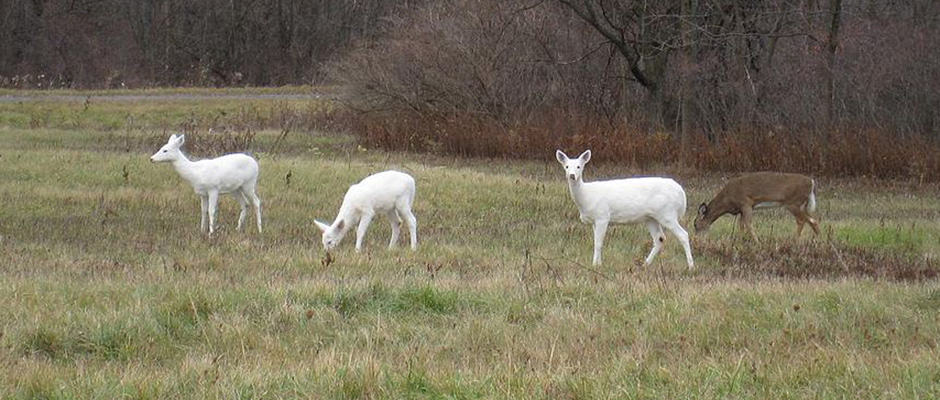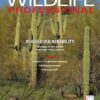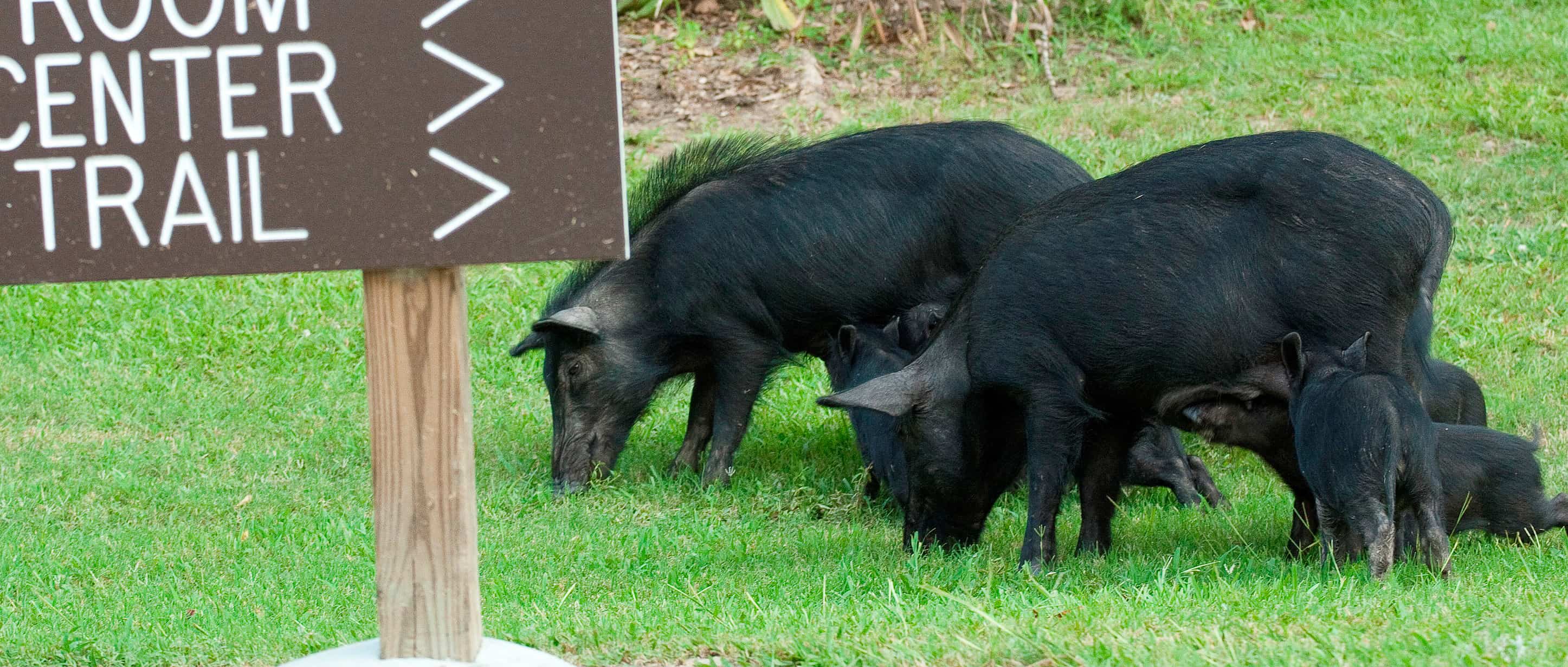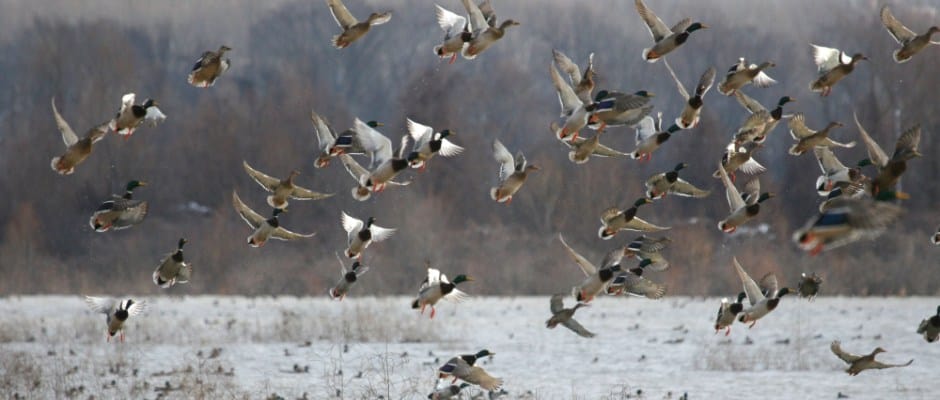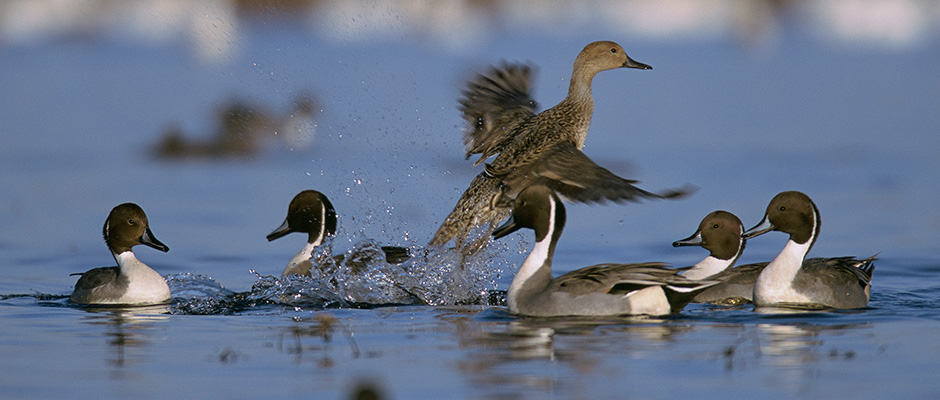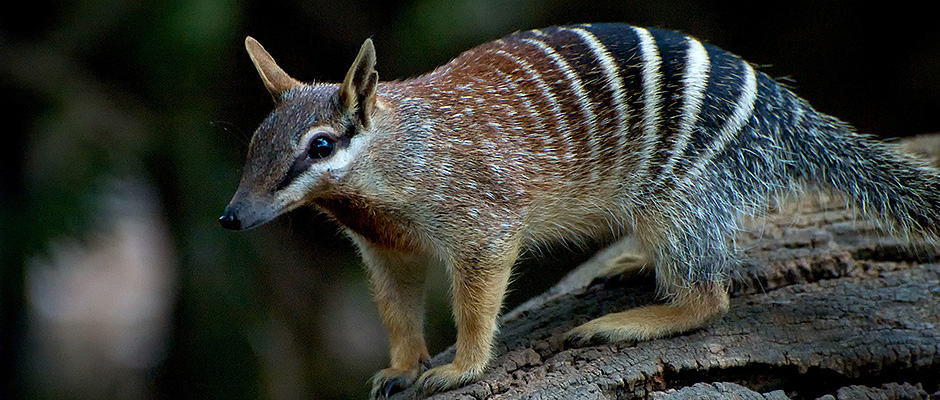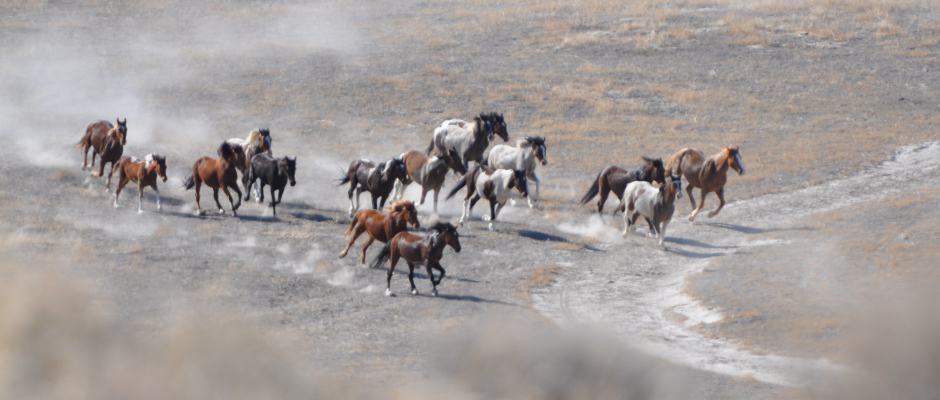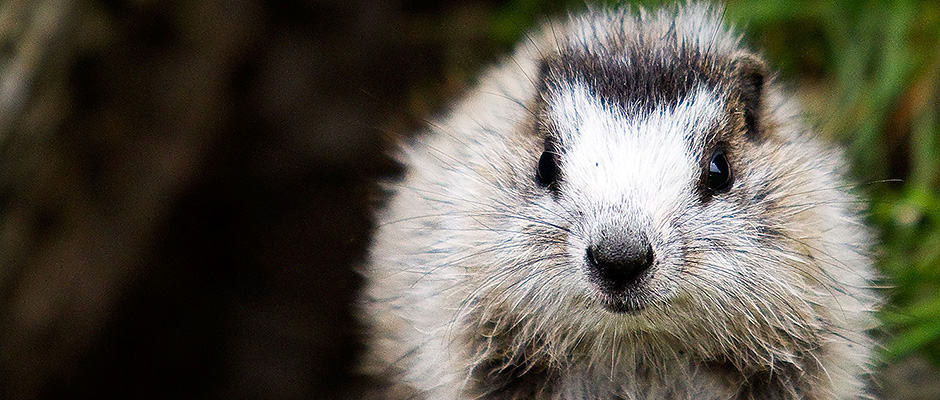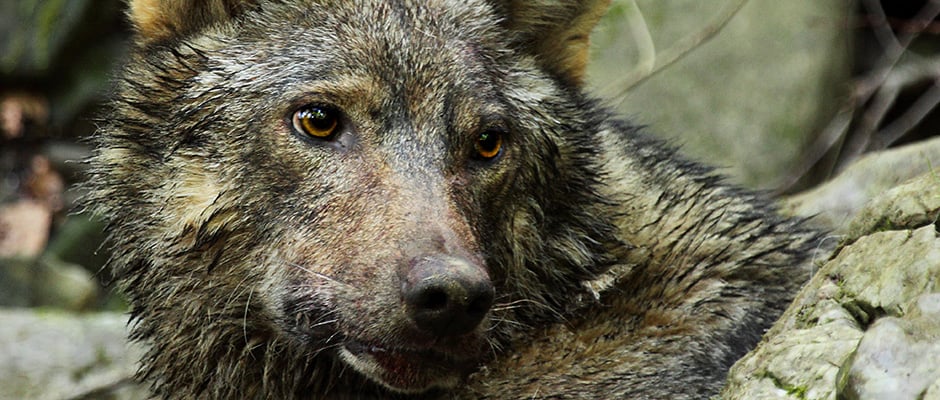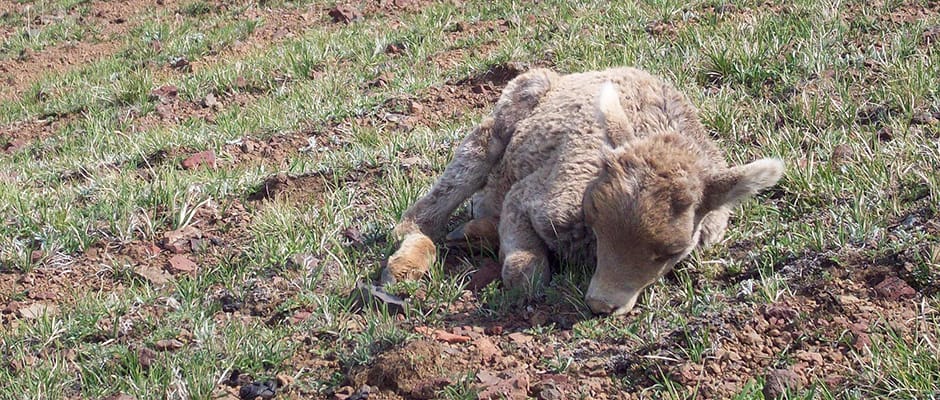
From the winter issue of The Wildlife Professional.
An open-access article written in collaboration with the Wildlife Disease Association — a premier partner of The Wildlife Society.
DISEASE TRANSMISSION CREATES A THORNY WILDLIFE-LIVESTOCK DIVIDE
Earlier this year, a federal judge upheld a 2010 decision by the Payette National Forest in Idaho to close 70 percent of its forest to domestic sheep grazing in an effort to protect the region’s wild bighorn sheep (Idaho Statesman, 2014). The decision was based on evidence that domestic sheep can spread pneumonia to wild bighorns and, as a result, forest service officials called for separation of the animals. The federal judge, Wallace Tashima was responding to the Idaho Wool Growers Association’s motion to overturn the decision, based on an argument that there was uncertainty over whether domestic sheep did indeed transmit pneumonia to wild bighorns.
Unfortunately, disease transmission from livestock to wildlife and vice versa does occur. In fact, every year, cattle in Michigan fall prey to bovine tuberculosis — a disease once widespread in cattle that is now spread primarily by white-tailed deer (Odocoileus virginianus). Meanwhile, wild bighorns are regularly infected with pneumonia that’s transmitted by domestic sheep — forcing wildlife and livestock managers to do all they can to address and manage these ongoing threats amidst conflict and controversy.
When Wildlife Infect Livestock: Bovine Tuberculosis
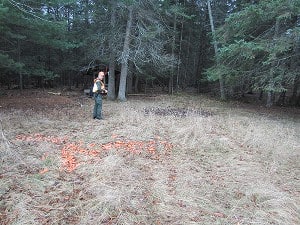
Warren MacNeill, conservation officer with the Michigan Department of Natural Resources Law Enforcement Division surveys piles of carrots (foreground left) and sugar beets (background center) placed as deer bait in Michigan’s Alcona County, where baiting has been illegal since 1999. While local cattlemen generally applaud the restrictions, merchants, vegetable farmers, and many deer hunters decry them as unneeded, detrimental to the “good nutrition” of the deer, and an unconstitutional intrusion on property owners’ rights.
Image Credit: Daniel O’Brien
Mycobacterium bovis, the causative agent of bovine tuberculosis (bTB), originated from an ancestor of human tuberculosis (Smith et al. 2009). The most common strains of M. bovis were likely imported to North America from Great Britain in the nineteenth century via infected cattle (Smith et al. 2011). M. bovis infects a wide variety of species (O’Reilly and Daborn 1995), including humans (Grange 2001). In fact, public health concerns about bTB by 1900, particularly in children (Palmer and Waters 2011), led federal, state, and local governments to establish the bTB eradication program in 1917, which included cooperative measures such as tuberculin testing of cattle and meat inspection laws in an effort to eliminate bTB in livestock (Olmstead and Rhode 2004, Palmer and Waters 2011). The program was largely successful and, by 1940, researchers estimated that 25,600 human lives in the United States had been saved as a result (Olmstead and Rhode 2004). Further, the program’s benefits to the livestock sector between 1918 and 1962 were estimated at approximately $3.2 billion.
Despite these successes, however, bTB continues to persist in free-ranging wildlife, although in some cases, culling has proven hugely successful in reducing transmission and the potential for transmission from the wild to domestic cattle herds (Corner 2007, O’Brien et al. 2011b). For example, although feral Asian water buffalo (Bubalis bubalus) in Australia maintained bTB, intensive culling eliminated both the disease and its reservoir host. In fact, combined with testing and controlled movement of cattle, culling allowed Australia to declare bTB freedom in 1997, and 2000 marked the last case of bTB in cattle. Further, the disease was declared exotic to Australia in 2010 (Radunz 2014).
New Zealand has seen similar successes related to introduced brushtail possums (Trichosurus vulpecula) — identified as maintenance hosts of bTB since 1967. As part of the bTB eradication effort, officials employed an intensive possum culling strategy of “systematic overkill” (O’Brien et al. 2011b), combined with cattle testing and movement controls. As a result, infected cattle herds have been reduced by 95 percent since 1994. Further, bTB has been eradicated from possum populations across 500,000 hectares since 2011 (Livingstone et al. 2014).
Complicated Eradication Efforts
Culling is more straightforward when target species such as water buffalo and possums are considered invasive pests and, therefore, treated as such. However, where the target species is publicly esteemed for its economic and cultural merit such as white-tailed deer (Odocoileus virginianus) in the U.S. (an important source of hunting revenue) or for its conservation value such as wood bison (Bison bison athabascae) in Canada (considered the most important remnant population of a once-abundant species), opposition to culling has forced scientists and wildlife managers to search for alternatives. These include vaccination (Waters et al. 2012), programs for captive breeding of bTB-free animals followed by reintroduction (Nishi et al. 2006), and human dimensions approaches that are aimed at improving hunter cooperation with agency disease control strategies (O’Brien et al. 2011b).
Culling can also have complex, unforeseen consequences. In the case of Eurasian badgers (Meles meles) in the United Kingdom, culling has been found to disrupt the animals’ social structure, causing survivors to range more widely and over longer distances. This phenomenon — referred to as the “perturbation effect” or PE (Godfray et al. 2013) — may increase bTB transmission among badgers and to cattle. In a major Randomized Badger Culling Trial (Donnelly et al. 2007) conducted at 10 replicated sites in the U.K. between 1998 and 2005, the PE was considered responsible for increased prevalence of bTB in badgers in culled areas and suggested as an explanation for higher rates of cattle herd infections in some culled areas. In contrast, a major badger culling trial in the Republic of Ireland between 1997 and 2002 found culling significantly and consistently reduced the risk of cattle herd infections in culled areas (Griffin et al. 2005).
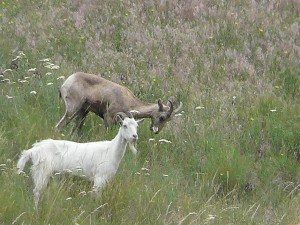
A domestic goat and bighorn sheep share the same space on open range land in
Hells Canyon, Idaho. Both sheep and goats can carry lethal strains of bacteria and mycoplasma. Although grazers insist that it is rare for the animals to co-mingle, numerous cases have been documented where feral or lost sheep or goats have joined bighorn herds, and vice versa.
Image Credit: C.A. Johnson
Public involvement also can aid or complicate disease eradication efforts. In Minnesota, for example, the public tolerated four consecutive years — 2007 to 2010 — of ground and aerial culling of deer in order to eradicate a spillover of bTB from cattle before it became established (Carstensen and DonCarlos 2011). Impressively, deer hunters’ license fees funded approximately 90 percent of culling operations (Carstensen et al. 2011). Combined with increased harvest opportunity, culling reduced the deer population in Minnesota’s core area by 55 percent and apparent bTB prevalence to zero. No infected deer have been identified since 2009, and Minnesota regained its bTB accredited-free status for cattle in 2011.
In contrast, Michigan’s residents were opposed to large reductions in deer numbers (Dorn and Mertig 2005, Frawley and Rudolph 2008), making agency culling politically untenable. Further, winter feeding and baiting of deer, which concentrates them and exacerbates disease transmission, has been difficult to eliminate. While hunters halved the deer population in Michigan’s core area by 2004, it has since rebounded, and the downward trend in bTB prevalence abated (O’Brien et al. 2011a).
The debate surrounding the use of culling for bTB control in Michigan is a good example of differing perceptions between wildlife conservationists and livestock advocates about what constitutes appropriate use of a publicly owned wildlife resource. For example, hunters and animal protection advocates find themselves (perhaps awkwardly) on common ground in opposing drastic reductions in deer numbers to eradicate bTB, emphasizing the low prevalence of disease and its imperceptible effect on the deer population (O’Brien et al. 2011a). Cattle producers counter that if even one of their cows is diagnosed with bTB, they risk the entire herd being depopulated. Further, cattle farms in the state that are infected with bTB must agree to a federal- and state-approved herd plan that mandates farm management practices if the producer is to receive full indemnity for condemned cattle. Such practices may include restricting access of cattle to lowland areas frequented by deer.
Federal and state epidemiologists consider these measures prudent risk management. Cattle producers argue that forcing them to exclude any of their land from grazing constitutes unconstitutional ‘taking’ of private property by the government.
When Livestock Infect Wildlife: Bighorn Pneumonia
In contrast to bTB, with pneumonia the primary concern is that domestic livestock may spread disease to wildlife. Researchers have accumulated a large body of evidence over many years including nearly 100 years of observations of bighorn getting sick and dying after contact with domestic sheep or goats (Goodson 1982), observations on experimental mixing under more controlled conditions (Wehausen et al. 2011), pathogen inoculation trials (Wehausen et al. 2011), cellular level research on comparative immune function (Silflow et al. 1989, 1993), and risk analyses (Clifford et al. 2009).
Domestic sheep and goats can carry a number of pathogens including, but not limited to Mannheimia haemolytica and Mycoplasma ovipneumoniae, which are pathogenic to bighorn and Dall sheep
(Callan et al. 1991, Foreyt et al. 1994a, 1996, George et al. 2008, Onderka and Wishart 1988). These two organisms, singly or more often together, can cause acute fatal pneumonia in bighorn sheep, sometimes wiping out entire herds; but survivors can carry hem and subsequently pass them along to lambs and other susceptible adult animals. Although not all bighorn pneumonia outbreaks have been associated with prior contact with domestic sheep, many across most of the western states have. In fact, an analysis of over a dozen experimental or observational studies where captive bighorn were exposed to domestic sheep found that 79 of 80 otherwise healthy bighorn put in contact with normal domestic sheep under varying conditions in 12 separate trials died. To a perhaps lesser extent, domestic goats may pose a similar risk to bighorn sheep (Jansen et al 2006, Foreyt 1994b).
Recently, researchers at Washington State University were able to provide unequivocal evidence that domestic sheep can transmit fatal bacterial pneumonia to bighorn sheep under conditions of close contact (Lawrence et al. 2010). As part of the study, they introduced gene spliced and florescent-dyed bacteria, Mannheimia (formerly Pasteurella) haemolytica into the nasal cavity of domestic sheep, noting that the organisms were not present in bighorn. Researchers found that when the sheep and bighorn were separated by double fencing at various distances nothing happened; however, when they were allowed fenceline contact, one bighorn became ill. Further, when the animals were allowed to comingle, all the bighorn quickly succumbed to pneumonia caused by the gene-marked bacteria.
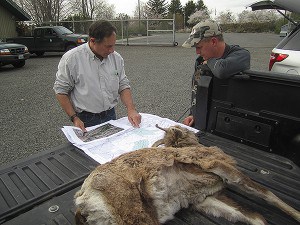
Richard Harris (left), wildlife manager with the Washington Department of Fish and Wildlife and Glen Landrus, then president of the Wild Sheep Foundation’s Washington Chapter, examine a bighorn ewe from the Tieton herd that died of pneumonia in April 2013. Ultimately, the entire herd was sacrificed in an effort to prevent the spread of a devastating pneumonia outbreak to adjacent bighorn herds.
Image Credit: Kristin Mansfield
The U.S. Forest Service (USFS) and bighorn advocacy groups have sought to implement policies and practices, such as swapping problematic sheep allotments for cattle grazing allotments (cattle don’t carry the disease) or trucking sheep out of high country instead of trailing them down through bighorn habitat, that maximize separation and reduce risk of contact—basic principles of preventive medicine. The cattle industry also uses preventive approaches to limit spread of “shipping fever pneumonia” in cattle, a very similar disease caused by many of the same bacteria that can lead to severe disease and death in calves especially after stressful conditions such as shipping long distances. In addition, the Association of Fish and Wildlife Agencies has endorsed a set of best management practices that emphasize separation of domestic and bighorn sheep to reduce disease transmission.
However, here, too, there’s conflict over management measures and policies to address disease transmission from domestic sheep to wildlife. For example, groups such as the Wild Sheep Foundation, Western
Watersheds Project, and others have argued that retiring domestic sheep grazing allotments, or optimizing viewing and hunting of bighorn sheep, is far more financially productive than domestic sheep grazing on what are fairly marginal lands. In addition, they argue that funds spent by bighorn viewers and hunters better support rural communities, and that the fees paid by woolgrowers to use public lands are often less than the cost of administering the leases.
Meanwhile, grazers point out that just as wildlife species often can’t survive without using private lands, many grazers can’t survive without access to public lands. Further, woolgrower lobbyists argue that close contact between the animals rarely occurs under free-ranging conditions. These lobbyists have succeeded in blocking USFS funding to reduce contact between bighorn and domestic sheep until a more effective and efficient vaccine is developed. The current prototype vaccine requires four evenly spaced shots given to healthy animals at optimal intervals — something that’s not feasible to implement in the case of free-ranging bighorn sheep. The vaccine also doesn’t provide any protection against Mycoplasma ovipneumonia, a major causal component of the bighorn pneumonia complex. Further, the organism lives within cells, which makes any vaccination effort nearly impossible.
Still, efforts are underway to at least partially bridge some of these divides. In Wyoming, the Statewide Bighorn/Domestic Sheep Interaction Working Group — established in 2000 — developed a set of recommendations in 2004 that has served as a template for managing bighorn and domestic sheep (State-wide Bighorn/Domestic Sheep Working Group, 2004). For example, the working group encourages the Wyoming
Game and Fish Department to prepare a map showing the distribution of occupied habitat for native core and reintroduced bighorn sheep populations. It also recommends the domestic sheep industry explore grazing management strategies that reduce impacts and enhance bighorn survival and calls for federal agencies to help develop and fund bighorn and domestic sheep education and outreach programs.
A Deep Divide
Despite a handful of attempts to achieve consensus, debate and conflict continue to play out in the news media, university research labs, state and federal wildlife and wild land management agencies, local communities, and in political efforts to either establish or block risk-reduction efforts. Disease-based wildlife-livestock conflicts are really a divide between business and utilitarian perspectives and traditional conservation perspectives about wildlife management. The divide is about whose financial interests will predominate when disease conflicts exist, who will have the greatest use of public resources, who will bear the costs of limiting disease transmission, and whether state and federal disease control and wildlife management policies can be enforced on private or even public land.
The divide isn’t just about disease and biology; there are huge political, financial, legal and social interests and precedents at stake. As is the case with conflicts over brucellosis in the Yellowstone ecosystem and Wood Buffalo National Park in Canada, efforts to resolve problems posed by bTB in deer and cattle and pneumonia in bighorn and domestic sheep continue to evolve. There are no easy answers and, as a result, these divides promise to be with us for the foreseeable future.
